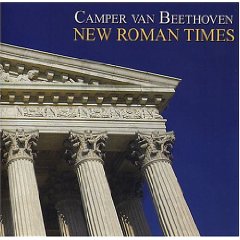Hello all. Long time no see. Been a bit busy; more on this later. But I wanted to respond first to Joshua Starr’s post about the Thermals a few weeks ago (in response to my post about Joanna Newsom). His post reminded me of another album that listens like a novel: Camper Van Beethoven’s New Roman Times,1 which is, well, about the disintegration of the United States in a civil war, all told from the point of view of a young man who, in the course of the album, goes from soldier to intelligence officer to resistance fighter to suicide bomber. It’s all laid out in the song index,2 though this being Camper Van Beethoven, the plot is often strayed from to include some neo-hippie gorgeousness; surreal, angry, and funny political snark; big genre-blending instrumentals; a piece by Steve Reich (!); and a little ska-inflected trip to Uzbekistan. Also, the music is pretty great.
For Camper fans, New Roman Times is laden with band backstory, which I won’t recount here except to say that it’s really nice to have this band back. For even non-Camper fans, the interesting aspect of this album, released in 2004, is how political it is. Lead singer David Lowery told the Onion that he decided New Roman Times “was going to be political in a way, but not a direct commentary. More an exaggeration of what’s going on today.” Exaggeration is putting it mildly; politically speaking, New Roman Times is a bit of a Molotov cocktail. The more humorous and surreal parts of the album are also among its most frightening. And the closing song, “Hey Brother”—a monologue from our protagonist, now a suicide bomber, performed as a psychedelic country number—is both very hard to listen to and very hard not to.3 It’s the lead guitar that does it, an uplifting, gorgeous line that curdles into sarcasm, rage, and tragedy.
I’ve also been thinking a bit about New Roman Times because I’ve been fortunate enough to get ahold of a galley of Robert Charles Wilson’s next book, Julian Comstock: A Story of 22nd Century America, due out in June, which also deals with the disintegration of the United States as we know it, albeit in a very different way and in considerably more depth.4 This got me to thinking about the extent to which prevailing politics affect what artists choose to write and sing about.5 How much will a change in presidential administrations lead to a change of tone in the books and music that we create?
1
Yeah, that’s a font joke. Take a look at the album cover.
2
The song index reads thusly: Prelude (A catastrophic attack occurs); Sons of the New Golden West (A secretive cabal implements their plan); 51-7 (A young Texan volunteers for an elite military unit); White Fluffy Clouds (Soldiers sing the praises of their weapons); That Gum You Like Is Back in Style (A retired intelligence officer contemplates cryptic transmissions); Might Makes Right (The young soldier begins to have doubts); Militia Song (Meanwhile civil unrest and right-wing violence in the Republic of California); R ‘n’ R in Uzbekistan (Rest and relaxation in the czarist republic); Songs of the New Golden West (Reprise) (A coup d’etat in California); New Roman Times (The young soldier returns to Texas disillusioned and minus a foot); The Poppies of Balmorhea (At a West Texas oasis the ex-soldier is introduced to a narcotic flower; The Long Plastic Hallway (The ex-soldier goes to occupied California, is wined, dined, and recruited by TexSecurIntellicorp); I Am Talking to This Flower (The ex-soldier doesn’t like his new job, but enjoys hanging out with drug dealers and arms traffickers); Come Out (A famous minimalist composer has a pop hit inspired by the anti-fascist riots in Watts, California); Los Tigres Traficantes (The traffickers sell their stuff); I Hate This Part of Texas (in broken Spanish) (The ex-soldier attempts to contact members of the CVB resistance group); Hippy Chix (The ex-soldier takes the oath and joins the CVB); Civil Disobedience (Seemingly disturbed homeless man harangues retired intelligence officer); Discotheque CVB (At a party on the northern coast of California, the ex-soldier has a vision); Hey Brother (A suicide bomber prepares for his mission). Clearly a bit of thought went into this.
3
It is easy for me to imagine some people finding the album irresponsible, disrespectful, and possibly offensive for the way that it charges very directly into some very sensitive territory. I didn’t find it so, and because I’m a big proponent of the First Amendment, I would simply choose not to write about it if I did. I also could write a long essay defending Camper Van Beethoven’s aesthetic choices if forced to, but I’d rather not. Suffice it to say that this album is definitely not for everyone. There: You’ve been warned.
4
Which shouldn’t be all that surprising, given that Julian Comstock is a book and New Roman Times is a record.
5
For the record, I have no idea to what extent Robert Charles Wilson had current events in mind when he wrote Julian Comstock and would rather not speculate.










